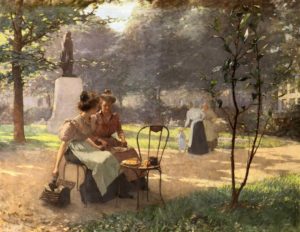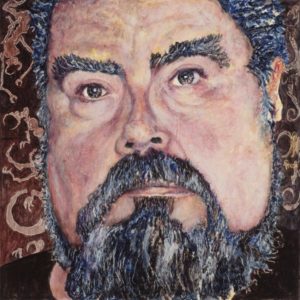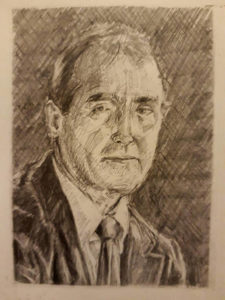I am surprised that the Christian author of The Occidental Observer (TOO) article I was talking about yesterday responded to me in several TOO comments. Generally, white nationalist Christians have simply ignored me. For example, I have said countless times that the fact that the Spanish and the Portuguese mixed their blood in Latin America since the centuries when Christianity was in good shape means that the problem of Aryan ethnosuicide is more complex than what Judeo-reductionists claim, insofar in those times the Inquisition reigned in the Americas, an institution that controlled the Jews. The American racial right has ignored these facts so many times that I gave up and resigned myself to posting almost exclusively on this site, instead of trying to communicate with them on their forums, as I did quite often in the past. That’s why the Christian author’s several responses in the TOO discussion thread surprised me.
Below I not only quote my second retort, posted today, on TOO but some other things that I would like to respond to the Christians who are commenting in that thread.
RockaBoatus, the author of the article ‘A 2000-Year-Old Rabbinical Psyop: Did Jews Invent Christianity to Deceive Gentiles?’, told me:
What you’re reading today [textual criticism of the New Testament—Ed.] are simply rehashed and outdated polemics that are about 150 years old with a new sophisticated twist. Conservative biblical scholars have refuted this nonsense…
By ‘conservative biblical scholars’ what you really mean is fundamentalist scholars.
Did you notice that above [i.e., in my first retort] I mentioned Ian Wilson, an English Catholic who has defended Christianity throughout his literary career? Unlike the list of fundamentalist Christians you cite, Wilson is honest enough to agree that what you call ‘outdated polemics that are about 150 years old’ are not outdated at all (cf. his book Jesus: The Evidence).
And Miller, whom I also mentioned above [again, in my first retort], is not anti-Christian like Carrier, who was never a Christian. Miller was a fundamentalist Christian who learned Greek, Latin, German and French to study the New Testament as a full-time scholar. Only when his research was advanced did he realise that there were serious problems with the so-called scholarship promulgated by his evangelical colleagues. This passage from a YouTube interview with Miller is vital to understanding his spiritual odyssey from traditional Christianity to apostasy. In fact, that YouTube channel, with its countless interviews with other NT scholars, can serve wonderfully to answer you (which I can’t do point by point because, as I said, it would take me days).
Regarding the rest of what you say, as well as what Pierre de Craon tells me about the evangelist John, in order not to overwhelm this discussion thread I think I’ll answer it in the next entry of my blog.
The only thing I would like to clarify now is that the thesis that Judeo-Christianity is a Jewish psyop is not exactly my thesis, but Skrbina’s. Rather than blaming St Paul et al, I blame Constantine and the house of Constantine (except Julian) for using the most toxic religion of the Mediterranean, the one inspired by intolerant Judaism, to control the population of the empire. If you don’t want to read the mini-book by the Spaniard Velasco that I linked above, see at least these excerpts from Vlassis Rassias’ book about how the Judeo-Christians of the 4th, 5th, and 6th centuries destroyed the temples, sculptures, art and books of the classical world.
That is the starting point to understand the darkest hour of the West.
______ 卐 ______
The above is what I posted today on TOO. In one of his several replies to my yesterday’s retort, RockaBoatus said: ‘Jews did NOT “invent” Christianity.’ But he omits that St Paul was Jewish. He omits that the rabid hatred of John of Patmos, the author of the last book of the Christian Bible, was anti-Roman and that the ‘Seven Churches’ to which he wrote (Book of Revelation, 1:11) were in towns replete with Jews. He also omits that even Christian theologians admit that evangelists like Matthew were Jewish, and also the author of the Epistle to the Hebrews.
Another Christian, who has frequently commented on TOO discussion threads, Pierre de Craon, responded to me by claiming: ‘attributing Revelation to John the Apostle is a sound judgment.’
That caught my attention since the consensus of New Testament scholarship is that the Book of Revelation dates from the end of the first century c.e., and a putative apostle from the beginning of the 1st century wouldn’t have lived that long. But to understand cultured Christians like Pierre de Craon I would like to digress a bit.
NT scholars can be classified into three groups: fundamentalists (there are also Catholic fundamentalists, not just Protestants, who believe in the historicity of the Garden of Eden, etc.), liberal Christians and non-Christians.
Since I come from a very Catholic family, in the 1980s I began to read liberal theologians, such as Hans Küng, who unlike the fundamentalists incorporated, to a certain extent, the textual criticism of the NT that has been doing since the Enlightenment, sometimes admirably summarised by Christians such as Albert Schweitzer’s classic The Quest of the Historical Jesus.
 Fundamentalists haven’t responded honestly to this textual criticism which, I insist, sometimes comes from exegetes who have not apostatised from Christianity. And exactly the same can be said of the racial right.
Fundamentalists haven’t responded honestly to this textual criticism which, I insist, sometimes comes from exegetes who have not apostatised from Christianity. And exactly the same can be said of the racial right.
Generally, Christians on the racial right as Pierre de Craon belong to the first group: that of Catholic and Protestant traditionalists. They haven’t even managed to assimilate what the liberal Christians have conceded long ago (e.g., Schweitzer’s 1906 classic). In my first retort I mentioned Ian Wilson, who with his books on the Shroud of Turin has even tried to create a kind of contemporary apologetics to support the historicity of the resurrection of Jesus. But many of the Christians who comment these days in the discussion thread of the aforementioned TOO article don’t even know that a textual criticism of the NT exists: criticism that Christians like Wilson have already incorporated, for so many decades, into their way of seeing the world.
And what about the third group: the non-Christian scholars who dedicate themselves to studying the NT? What does one of them say about the book of Revelation, say, Carrier?
Revelation was written in the reign of Domitian (the 80s or 90s AD) and used Matthew as its base text. It is indeed an anti-Pauline document, but so is Matthew. And both were written in Greek, and thus for audiences outside Palestine. There is no evidence anyone was alive at that time who would know anything first-hand about the origins of Christianity, least of all the Pillars (they would be two generations gone by then), much less any who would ever have even heard of, much less read, Revelation (or Matthew for that matter). We also have no reactions to Revelation’s publication, so we have no idea how anyone responded to it anyway.
Revelation references no sources; in fact, it claims to have all its information from mystical visions, not any objective evidence at all. Someone, in other words, just dreamed all this (or was claiming to). And so far as we know it had no sources, other than “The Gospel according to Matthew,” which was simply an expanded redaction of the “Gospel according to Mark.” Revelation is therefore derivative and thus cannot corroborate anything. All it does is prove Matthew’s historicism existed at that time. Which we already know—from Matthew (and Mark, whose text is even earlier). It therefore can have no effect on the probability of historicity. Once the Gospels exist, it is already 100% expected there will exist texts expanding and riffing on them, like this, regardless of whether Jesus existed or not. So we are back to simply assessing the probability of the Gospels.
Nevertheless, Revelation is actually a little cagey about whether historicity is actually true, rather than symbolically represented. In Rev. 11 it sufficiently implies Jesus was crucified in Jerusalem; but in Rev. 12, Jesus is born in a lower heaven (in the vicinity of the moon), and soon whisked away to even higher levels of heaven, and seems never to leave there (in a manner that fits the Star Gospel that in OHJ I find in Ignatius and the Ascension of Isaiah). So it’s unclear which version of events the author believed actual and which merely allegorical. It could be both, depending on one’s level of initiation at the time, just as was the case for Osiris cult.
But regardless, since the author shows no sign of having any sources of information other than the Gospels we already know about, and his own imagination, it doesn’t matter. We can’t use it to prove anything in the Gospels is true. We can only use it to prove they were circulating by then, which we already knew, and thus already accounted for.
Based on what I said recently about my autobiographical work and how I can recover my previous Christian selves in exercises of the imagination, people like Miller and I are capable of psychically ‘encompassing’ folks like the Christians who comment in TOO. But they cannot return the favour because they have never experienced any apostasy in their minds (let’s say, that an apostate like Miller returned to the shelter of fundamentalist Christianity).
Update of November 6th
My last comment in that TOO thread was posted today.







